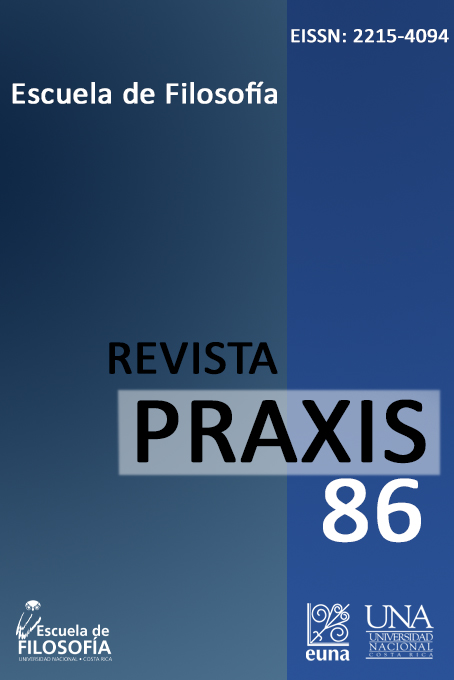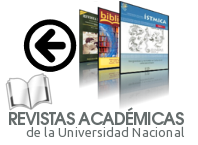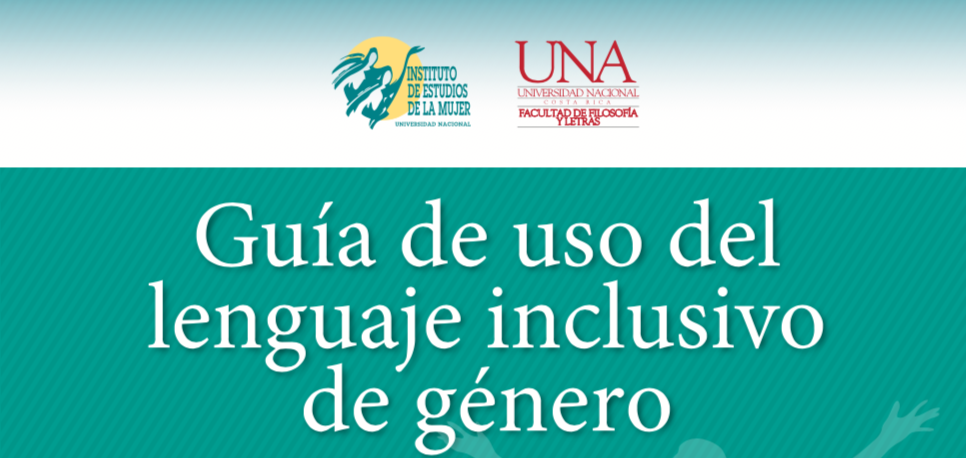Sublime Animal: Nature and desire in Clement of Alexandria
DOI:
https://doi.org/10.15359/praxis.86.6Keywords:
desire, sexuality, instinct, nature, animality, beautyAbstract
This article intends to understand, firstly, three notions related to desire in the work of the theologian of the second century AD Clement of Alexandria. These notions, aphrodisia, orexeis and epithymia, gather meanings that have been ambiguously translated and interpreted as ‘sexuality’; however, this paper intends to analyze more broadly and carefully the semantic and philosophical scope of those terms, as well as their treatment in the work of pioneering authors of the history of sexuality such as Michel Foucault, posing a review of the approach to Clementine’s work in his History project.
References
Clemente de Alejandría (1998). Pedagogo. Gredos.
Clemente de Alejandría. (1996). Stromata I. Conocimiento y religión. Ciudad Nueva.
Clemente de Alejandría. (1998). Stromata II-III. Conocimiento religioso y continencia auténtica. Ciudad Nueva.
Clemente de Alejandría. (2005). Stromata VI-VIII. Vida intelectual y religiosa del cristiano. Ciudad Nueva.
Dover, K. J. (2008). La homosexualidad griega. El Cobre Ediciones.
Fernández Vega, P. A. (2018). Bacanales. El mito, el sexo y la caza de brujas. Siglo XXI.
Foucault, Michel (2019). Historia de la sexualidad IV. Las confesiones de la carne. Siglo XXI.
Fraisse, G. (2003). El concepto filosófico de género. En De Tubert, S. (Editor). Del sexo al género. Los equívocos de un concepto (pp. 39-46). Ediciones Cátedra.
Grimal, P. (2017). El amor en la antigua Roma. Paidós.
Laqueur, T. (1990). La construcción del sexo. Cuerpo y género desde los griegos hasta Freud. Cátedra.
Marcovich, M. (editor) (2002). Clementis Alexandrini Paedagugus (Supplements to Vigiliae Christianae. Formerly Philosophia Patrum. Texts and Studies for Early Christian Life and Languaje). Volume LXI. M. Leiden. Brill.
Naughton, V. (2005). Historia del deseo en la época medieval. Quadrata.
Ortiz Valdivieso, P. (2001). Concordancia manual y diccionario griego-español del Nuevo Testamento. Sociedad Bíblica.
Santos Otero, A. (2006). Los Evangelios Apócrifos. Biblioteca de Autores Cristianos.
Schifter Sikora, J. (2016). Historia de la sexualidad. EUNED.
Sebastián Yarza, F. I. (director) (1998). Diccionario Griego-Español. tomos I y II. Editorial Ramón Sopena.
Sissa, G. (1991). Filosofías del género. Platón, Aristóteles y la diferencia sexual. En De Duby, G. y Perrot, M. (editores). Historia de las mujeres. Tomo I. La Antigüedad. Taurus.
Torres, J. (2009). La historia de un monje hereje: Joviniano y el conflicto entre virginidad y matrimonio en el siglo IV. En Marcos, M. (Editora). Herejes en la historia (pp. 49-76). Trotta.
Versaldi, G., & Vincenzo, A. (2019). Varón y mujer los creó. Para una vía de diálogo sobre la cuestión del Gender en la educación. Congregación para la Educación Católica.
Downloads
Additional Files
Published
How to Cite
Issue
Section
License
La revista trabaja bajo la Licencia Creative Commons Atribución-NoComercial-CompartirIgual 4.0 Internacional; apartir de la publicación número 79 (2019); en publicaciones anteriores se trabajaba bajo una Licencia Atribución- No Comercial- Sin Derivadas 4.0 Internacional.








